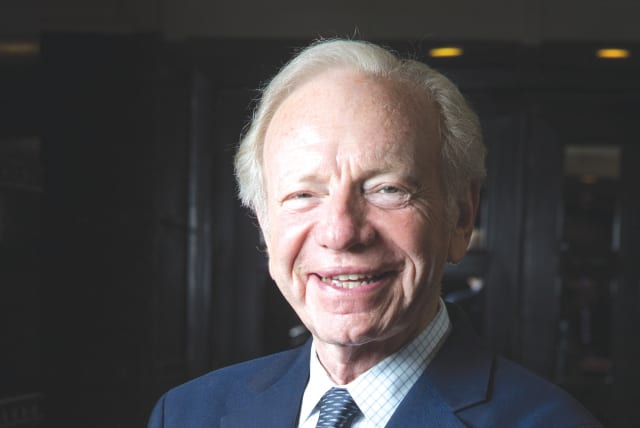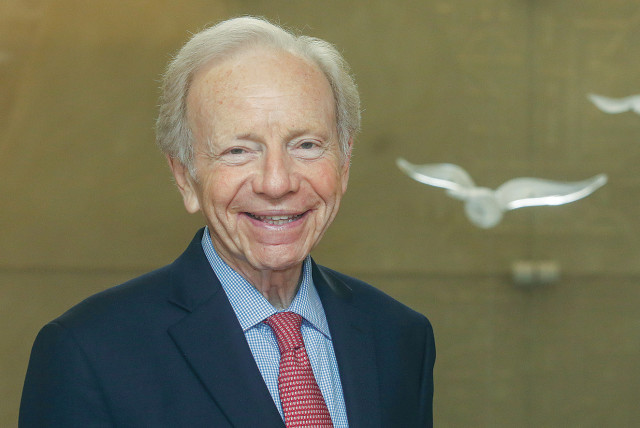'Promised to work for the American public 24/6': Former advisor eulogizes Senator Joe Lieberman

Lieberman and his family maintained a kosher household and strictly observed Shabbat. In a remarkable instance, he walked to the Capitol post-Shabbat services to prevent a Republican filibuster.
"It was the first campaign out of many that I worked on where... [the] candidate promised to work hard for the American public 24/6," former political advisor Jay Footlik shared with The Jerusalem Post, revealing the profound dedication the late Senator Joe Lieberman had to his service, a commitment deeply intertwined with his Orthodox Jewish faith. This campaign not only highlighted Lieberman's dedication to his constituents but also his adherence to observing the Sabbath, a testament to his unwavering commitment to his faith while serving the nation.
Footlik, who served as Special Assistant to President Clinton and has a vast background in domestic and international policy, provided this reflection on Wednesday, hours after it was announced that Lieberman had passed away at 82. His experiences, which span working directly in the White House to advising on numerous political campaigns, including Lieberman's, afford him a unique perspective on the senator's significant impact.
In remembering Lieberman, Footlik recalled their first interaction, which set the tone for their relationship: "He reached out knowing that I was working the Jewish portfolio [at the White House during the Bill Clinton administration]... and kindly offered his assistance," he said, highlighting Lieberman's proactive nature and his willingness to mentor and support those around him.
Throughout his career, Footlik found in Lieberman not only a source of wisdom and guidance but also a man of his word, a rarity in the often tumultuous sphere of politics. "There were many times where I needed some guidance and advice, and he was always there," Footlik emphasized, underscoring the trustworthiness and dependability that Lieberman was known for among his colleagues and constituents.
Footlik remembers Lieberman's 2004 presidential campaign as groundbreaking for its explicit commitment to balancing religious observance with public service. This approach was a declaration of Lieberman's values and a broader statement about the compatibility of faith and leadership in the American political landscape. "It was a big deal...he introduced a lot of our customs and practices [as Jews] to a broader array of America," Footlik observed.
Footlik also touched on the complex reactions within the American Jewish community to Lieberman's high-profile observance of his faith. "There was a paradox; on the one hand, tremendous pride...And on the other hand, there was some reluctance in the community," he explained. According to Footlik, this duality encapsulated the generational divide and the broader discussions about the visibility of Jewish Americans in public life. Yet, according to him, “Lieberman's campaign and career inspired many, encouraging a new generation to pursue public service while staying true to their faith.”
Lieberman's observance
Lieberman and his family maintained a kosher household and strictly observed Shabbat. In a remarkable instance, he walked to the Capitol post-Shabbat services to prevent a Republican filibuster, highlighting his dedication to his faith and political responsibilities. Lieberman believed in a constitutional space for faith within public life, opposing "freedom from religion." He was a member of several congregations, including Kesher Israel Congregation in Washington, DC, and others in New Haven, Connecticut, and his hometown of Stamford.
Admiring the late Rabbi Menachem Mendel Schneerson for his spirituality, intellect, and worldly involvement, Lieberman was influenced by notable rabbis such as Joseph Ber Soloveitchik and Abraham Isaac Kook in his studies. Lieberman also had a lighter side, enjoying singing and being a fan of Frank Sinatra. He used Sinatra's "My Way" as his campaign theme song. He also cherished singing the traditional Jewish song "Eshet Hayil” (A woman of valor) to his wife every Friday night.
Jerusalem Post Store
`; document.getElementById("linkPremium").innerHTML = cont; var divWithLink = document.getElementById("premium-link"); if (divWithLink !== null && divWithLink !== 'undefined') { divWithLink.style.border = "solid 1px #cb0f3e"; divWithLink.style.textAlign = "center"; divWithLink.style.marginBottom = "15px"; divWithLink.style.marginTop = "15px"; divWithLink.style.width = "100%"; divWithLink.style.backgroundColor = "#122952"; divWithLink.style.color = "#ffffff"; divWithLink.style.lineHeight = "1.5"; } } (function (v, i) { });

